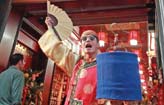Politics
Other parties play role in China's government
Updated: 2011-06-30 07:27
By Zhao Lei (China Daily)
BEIJING - About 32,000 Chinese people who are not members of the Communist Party of China (CPC) were working in government departments above the county level at the end of 2010, according to a senior Party official on Wednesday.
The non-CPC senior government workers were members of the country's eight other political parties or had no party affiliation, Chen Xiqing, vice-minister of the United Front Work Department of the CPC Central Committee, said at a news conference.
Prominent examples of senior people who are not members of the CPC include Minister of Science and Technology Wan Gang and Minister of Health Chen Zhu.
And 19 non-communists hold leading positions in the Supreme People's Court, the Supreme People's Procuratorate - China's top prosecuting authority - and central government departments under the State Council, or China's Cabinet, Chen said.
A total of 207 leading positions within provincial-level legislatures, governments and political advisory bodies were occupied by non-communists, he added.
Among the 31 provinces, autonomous regions and municipalities on the mainland, 30 have vice-governors, vice-chairpersons or vice-mayors who are non-communists.
"Many non-communist officials who have regular exchanges with our department have told us that they have been trusted with full power and authority in their work and will accordingly shoulder full responsibility," Chen said. He added that some CPC departments also invited non-communist officials to attend their conferences in an attempt to solicit different opinions.
Currently, about 840,000 people are members of the eight non-communist parties in China, said Zhang Xiansheng, spokesman for the United Front Work Department. He said the eight parties are all "friends" of the CPC.
The parties had around 10,000 members when the People's Republic of China was founded in 1949. The figure climbed to more than 60,000 when the country started its reform and opening-up process in the late 1970s, he said.
Zhang also noted that the democratic supervision of the eight parties over the CPC had proven effective and prevented possible faults in the Party's decision-making process.
"The nature of the democratic supervision of the non-communist parties is totally different from that of the Western political parties," he said.
"The ultimate motive of the so-called supervision of the opposition parties in Western countries is to break down or defeat the ruling parties. The democratic supervision of the non-communist parties in our country, in contrast, aims to help the CPC better fulfill its governance, prevent or avoid mistakes in making or implementing important policies and improve the policies of the CPC and the government."
He cited a proposal by the China Democratic League as an example.
The league submitted to the CPC Central Committee and the State Council a research report last year about improving the income distribution system. The report drew the attention of the CPC's top leaders, including Hu Jintao and Wen Jiabao.
At the request of the leaders, the National Development and Reform Commission and other central government departments introduced a series of measures to address the concerns raised in the report and some of the problems were resolved.
In response to a question about whether it would be possible for a new non-communist party to be founded, Zhang said the establishment of a political party can only become possible if there is a solid social basis for it and if there are sufficient people who want to join it. He noted that China now has nine political parties and said they can cover almost all social classes in the country.
"Given these circumstances, it is unnecessary to establish new parties."
E-paper

Franchise heat
Foreign companies see huge opportunities for business
Preview of the coming issue
Stitched up for success
The king's speech
Specials

Premier Wen's European Visit
Premier Wen visits Hungary, Britain and Germany June 24-28.

My China story
Foreign readers are invited to share your China stories.

Singing up a revolution
Welshman makes a good living with songs that recall the fervor of China's New Beginning.
